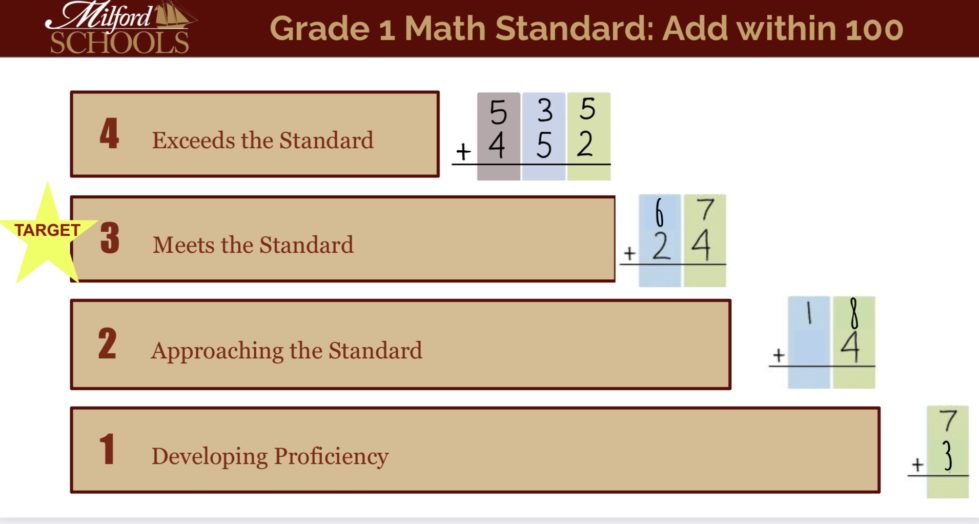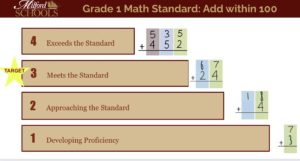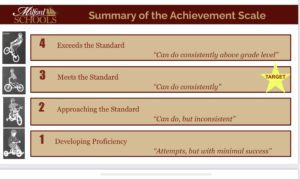At a recent meeting, Milford School District Board of Education discussed updates to their promotion policy. The changes are an extension of existing policy that will include new standards-based report cards used in the district for younger grades.
“This is merely an extension of our existing policy with a few grammatical updates as well as an expansion of our standards based report card that has been rolling out and phased from Kindergarten to first to second and now to third grade,” Dr. Bridget Amory, Interim Superintendent, said. “So it’s really just kind of a formality that we bring that here and then when we reviewed the policy, we did find a few grammatical errors that we wanted to clarify this evening.”
Board Vice-President Matt Bucher clarified that the updates to the policy would move grade two into the Early Childhood tier which was originally only Kindergarten and grade one.
“We’re providing them with a standards based report card which those students have had since they entered K,” Dr. Bobbie Kilgore, principal of Benjamin Banneker Elementary School, said. “So, now those standards will continue on with that same report card system as they enter second grade.”
Bucher commented that these policies were already in place, but that the actual board policy was playing “catch-up.” Dr. Kilgore stated that the changes were mostly just “tweaks” to the policy and that the families of children in Kindergarten and first grade had been getting that type of reporting since their child entered school.
“The only question I have is, this was a reservation that I had initially,” Dr. Adam Brownstein said. “My question is what the end game is, I mean, I understand we’re kind of doing this year to year but I’m thinking 10 years into the future is the idea that the class who are now second and third graders, as they move forward is the endgame of this to do away with traditional ABCD and move towards this sort of 1234 system or is the existing idea of where we would like to see this be in 10 years that there would still be a transition at some point during their school career, where they would go from a 1234 to a more, we’ll call traditional ABCD, etc.”
Dr. Kilgore explained that as students moved into higher grades, they would be transitioned to the traditional ABCD system.
“So, reporting it in a standards based format makes sense. Otherwise, what we’re trying to do is cram basically an ABCD on a program and an ideological system that was set up for standards based reporting,” Dr. Kilgore said. “So, I think that in the secondary schools, and Dr. Amory, please feel free to correct me if I’m misspeaking, but that would be a transition as we then moved over to that middle school age group where they would then be looking at that differentiation of perhaps an ABCD grading, which would be carried over into the high school as well.”
Dr. Amory confirmed that the intent was to maintain standards-based only at the elementary level and not transfer that into the middle or high school grades. Board member Jean Wylie commented that the new method was similar to what elementary schools used years ago.
“It is similar but it does have some different nuances,” Dr. Amory said. “I’d love to sit down and talk with you some of what’s changed since that original go round that we had many years ago.”
Dr. Brownstein further clarified the purpose of the changes to the policy.
“When you see the progress reports at the elementary school level, my understanding is it’s even subdivided further correct?” Dr. Brownstein said. “So, it’s it’s not just like English, you meet standards. There’s individual subdivisions to give a more robust, correct sort of synopsis of how that student is doing. So, there’s if there’s a particular area of weakness, this system helps to highlight that.”
Dr. Amory confirmed that Dr. Brownstein was correct. Dr. Brownstein pointed out that the new policy would provide parents with more detailed information about their child’s progress. Dr. Amory explained that this would provide parents with more details on their child’s strengths and areas of growth in more areas than just one singular grade. Wylie stated that parents would receive individual reports based on state standards that the child met on a particular day.
“Yes, and that report card is literally broken down standard by standard based on when it’s taught throughout the year and their progression from the beginning of the year to the end of the year,” Dr. Amory said.
MSD initially discussed switching to standards based report cards for all elementary grades, up through sixth. After getting feedback from board members in early 2022, the decision was made to scale back the rollout of the report cards, starting only with Kindergarten and first grade students in the 2022-23 school year. The following year, those students would move to first and second grade and the new reporting system would be used for Kindergarten through third grade starting in 2023-24. Fourth graders would begin receiving those type of report cards the following year until all students in Kindergarten through sixth grade were graded based on standards.
“In the traditional percentage-based grading system that we have used, students start with 100% and as they work through their assignments, their grade potentially drops from 100 as they make mistakes. With a standards-based report card, they can work kind of upward as they’re working toward that,” Dr. Amory said when the change to the grading policy was adopted. “Students can see themselves making that progress as they move through the system. This is again another analogy to help with the comparison between the traditional grading. So, if you were to take your vehicle to a mechanic, and the mechanic said, ‘Hey, I’m going to give you a score of a B-plus. What they aren’t telling you is all of the details that you would see, as indicated in the standards-based report card, where you would actually see the components of each one of the pieces of your vehicle that actually need to have the work done or if there’s something is performing well within your vehicle.”
There is a kind of “brain fog” involved in traditional grading methods, Dr. Amory explained at the time. A student who does well on a test but needs some work on an essay may have the same grade as someone who scored well on a test but did poorly on an essay. This can be confusing for the student to understand where they may need improvement or where they are excelling. Students with special needs who may have a 504 or an IEP as well as those who were multilanguage learners would have the same targets but their methods for achieving the target may be different. Dr. Amory explained that the piloted report cards would include the option for parents to provide feedback. She also stated that the district had worked with other districts, including Smyrna, who were using this type of report card system.
The MSD board will vote on the updated policy at their September meeting. Public comment on the policy is accepted at the beginning of the meetings, but all comment must be made in person during the meeting.
RELATED STORIES:
Share this Post





